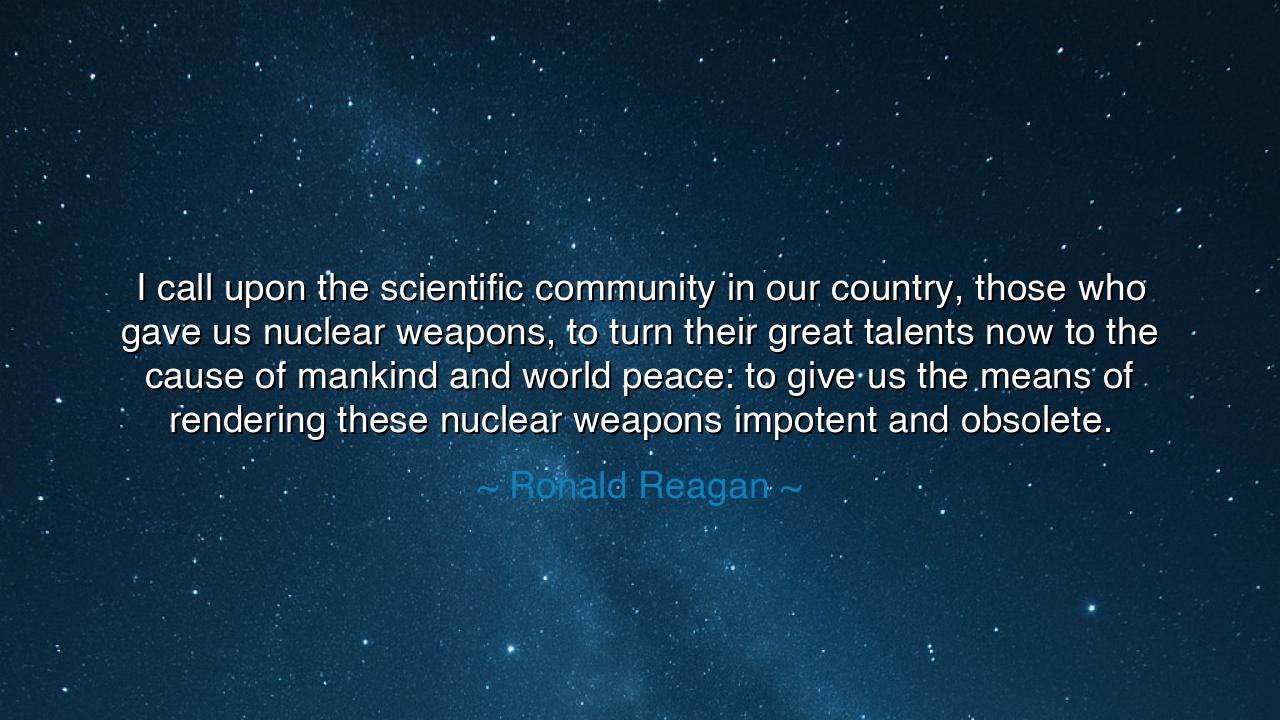
I call upon the scientific community in our country, those who
I call upon the scientific community in our country, those who gave us nuclear weapons, to turn their great talents now to the cause of mankind and world peace: to give us the means of rendering these nuclear weapons impotent and obsolete.






Hear now the words of Ronald Reagan, spoken at the height of a perilous age: “I call upon the scientific community in our country, those who gave us nuclear weapons, to turn their great talents now to the cause of mankind and world peace: to give us the means of rendering these nuclear weapons impotent and obsolete.” These words rose in 1983, during the Cold War, when the world trembled on the edge of annihilation, when mankind carried in its hands both the power to create life and the power to extinguish it utterly. Reagan’s voice was not merely that of a leader, but of a prophet calling forth a new vision—one where the brilliance that had crafted destruction would be turned instead toward peace.
The meaning is plain yet profound. Reagan did not condemn science, nor curse the genius of the minds that had built the bomb. Instead, he sought to redeem that genius, to redirect it toward a higher calling. Just as a sword can be beaten into a plowshare, so too could the knowledge of war be transformed into the instruments of life. He called upon the scientific community not to erase its past, but to transcend it. To him, the greatest victory would not be in building stronger weapons, but in making all weapons powerless before the shield of human creativity.
Consider the great irony of the atomic age: the same minds that unlocked the secrets of the atom brought forth both energy to light cities and bombs to level them. It is said that when the first atomic test exploded in the desert of New Mexico, J. Robert Oppenheimer recalled the ancient words of the Bhagavad Gita: “Now I am become Death, the destroyer of worlds.” Yet in later years, many scientists who had once toiled to build the bomb sought instead to restrain it, to find ways to prevent nuclear war. This was the spirit Reagan called forth—the transformation of knowledge from curse to blessing.
History offers us an image of this transformation. After the Second World War, the German rocket scientist Wernher von Braun, once the architect of weapons that rained terror upon cities, turned his brilliance to the heavens. In America, he became a father of space exploration, guiding the rockets that carried humankind to the moon. From destruction to discovery, from death to wonder—this is the power of redirection, the power Reagan longed to see in the realm of nuclear science.
The lesson is clear: humanity cannot unmake what it has created, but it can choose how to use its creations. Nuclear weapons could not be erased from memory, but they could be rendered useless, “impotent and obsolete,” if science turned its gaze to defense, diplomacy, and peace. The heart of Reagan’s plea was that mankind must never be enslaved to its own inventions. Science must serve life, not death; peace, not terror; hope, not fear.
O children of tomorrow, take this to heart: the tools you create will shape the fate of generations. Let your wisdom govern your knowledge, and let your vision guide your power. Ask always: does this creation preserve life, or destroy it? Does it bind humanity closer, or drive it apart? For in every discovery lies a choice, and in every choice lies the destiny of the world.
Practical action is this: cultivate within yourselves the spirit of responsibility. If you are builders, build for peace. If you are thinkers, think toward harmony. If you are leaders, call upon the gifts of your people not for domination, but for the cause of mankind and world peace. For the highest triumph of human genius is not in conquering others, but in conquering the fear and violence within ourselves.
Thus, remember Reagan’s call. He spoke not only to the scientists of his age, but to all who create, in every age. Render the weapons of death impotent. Make them obsolete. Let your talents rise like a shield over humanity, and may the light of your work banish the shadow of destruction forever.






AAdministratorAdministrator
Welcome, honored guests. Please leave a comment, we will respond soon